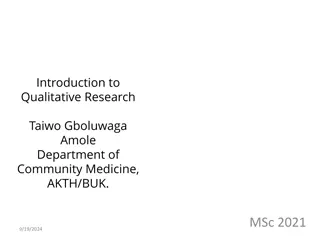
Qualitative Research Methods and Objectives
Explore the fundamental concepts of qualitative research, compare it with quantitative approaches, and learn about qualitative techniques and methods. Discover the aims of qualitative research, its focus on social phenomena, and the differences between qualitative and quantitative methodologies.
Download Presentation

Please find below an Image/Link to download the presentation.
The content on the website is provided AS IS for your information and personal use only. It may not be sold, licensed, or shared on other websites without obtaining consent from the author. If you encounter any issues during the download, it is possible that the publisher has removed the file from their server.
You are allowed to download the files provided on this website for personal or commercial use, subject to the condition that they are used lawfully. All files are the property of their respective owners.
The content on the website is provided AS IS for your information and personal use only. It may not be sold, licensed, or shared on other websites without obtaining consent from the author.
E N D
Presentation Transcript
An Introduction to Qualitative research Dr. Noura Abouammoh & Professor Ashry G. Mohamed KSU Collage of Medicine October 2015 nabouammoh@ksu.edu.sa
Learning Objectives To understand basic concepts of qualitative research To compare between quantitative / qualitative approaches to research To be introduced to some examples of qualitative techniques and methods April 25 Qualitative Research 2
Definitions and Terms Methodology: A way of thinking about and studying social reality Method: A set of procedures and techniques for gathering and analysing data Coding: Analytical process through which data are fractured, conceptualised and integrated to form theory April 25 Qualitative Research 3
What is qualitative research Qualitative research is a research methodology that is characterised by its aims, which relate to understanding some aspect of social life, and its methods which (in general) generate words, rather than numbers, as data for analysis. April 25 Qualitative Research 4
Aim of Qualitative Research Understand phenomena to inform policies and services Answer questions such as What, How and Why of a phenomena Examples: - Why do people smoke ? How do people contract infection ? April 25 Qualitative Research 5
Quantitative vs. Qualitative Quantitativemethodology Emphasises quantification in collection and analysis of data Test theories Based on positivism Views social reality as external and objective Results as numbers and statistics Qualitativemethodology Emphasising words, rather than numbers Generate theories Based on understanding the ways in which individuals and groups interpret their world Results as words and concepts April 25 Qualitative Research 6
Quantitative vs. Qualitative Qualitative mrthodology May, or may not, be representative Quantitative methodology Generalisability, representativeness Objective instruments (attitude/ outcome scales) Less structured instruments (interviews) Infer to population Do not infer to population Distance between researcher and Subjects Reflexivity and attention to individual participants Emphasis on following original research plan Flexibility of approach April 25 Qualitative Research 7
Quantitative vs. Qualitative Quantitativemethodology Methods Observational Experimental Mixed Qualitative methodology Methods Focus Groups Interviews Self-reports Observations Document analysis Sampling: Large random (simple, stratified, cluster, etc) or purposive Sampling: Small purposive Quality Assurance: Trustworthiness: Credibility, Confirmability, Dependability, Transferability Quality Assurance: Reliability Validity April 25 Qualitative Research 8
Quantitative vs. Qualitative Methodology Quantitative Method Experiment Technique RCT April 25 Qualitative Research 9
Quantitative vs. Qualitative Methodology Qualitative Method Interview Technique Semi-structured interview April 25 Qualitative Research 10
Characteristics of Qualitative Research Natural context Places where people interact Study of inanimate objects Non-manipulative - Researcher observes, interviews, records, describes settings as they are Researcher as instrument researchers engages in a situation and attempts to make sense of it Data collected through human observation Data interpretation through human perceptions study Subjectivity / reflexivity of researcher insights, experiences, perceptions of researcher are important part of the April 25 Qualitative Research 11
Characteristics of Qualitative Research Interpretive character researcher attempts to explain why and how something is happening - focus is on meaning rather than specific behaviours Focus on process, rather than outcome Depth (rather than breadth) of understanding Inductive analysis research begins with open-ended questions rather than attempting to test a priori hypotheses. Context sensitivity findings are placed in social and spatial context limiting generalisations April 25 Qualitative Research 12
Characteristics of Qualitative Research Empathic neutrality complete objectivity is not possible Attempt to understand (not prove) something Personal experience is included as part of relevant data Reflexivity attempting to include the role of the researcher in the whole process (question construction, design, analysis etc) Flexibility of design research is open to adaptation as understanding deepens or situations change Write from the perspectives of the participants (emic) rather from the researcher s own perspective (etic). What are participants thinking, why are they thinking it, what are their motives, goals values etc. April 25 Qualitative Research 13
Limitations of Qualitative Research Subjective Labour/time intensive Misunderstanding of novice researchers Limited generalisability April 25 Qualitative Research 14
Approaches/Designs to Qualitative Methodology (Examples) ApproachKey questions Case study What are the characteristics of a particular entity, phenomenon, person, setting? Ethnography What are the cultural pattern and perspectives of this group in their natural setting? Grounded theory How is an inductively derived theory about a phenomenon grounded grounded in the data/ setting? Phenomenology What is the experience of an activity or concept from the perspective of there particular participants? April 25 Qualitative Research 15
Qualitative Research Techniques Interviews/ focus group discussions Explores how tools are used and could be used in a novice programming course Gains insight into the meaning of tools for students for learning to programme April 25 Qualitative Research 16
Qualitative Research Techniques Participants observation (field notes) Gains insight into understanding cultural patterns to determine what s necessary and needed in tool development (complementary to interviews) April 25 Qualitative Research 17
Qualitative Research Techniques Document analysis April 25 Qualitative Research 18
Qualitative Research Techniques Data analysis Themes arising from data would provide insight into the issue(s) under investigation and see what is important to students / physicians / administrators April 25 Qualitative Research 19
Data Analysis Organize and prepare the data for analysis Read all data, get a sense of the whole Begin detailed analysis with coding process Generate a description of the setting /people as well as categories or themes for analysis Represent themes (writing, visual, etc.) Interpret and make meaning out of data *iterative, non-linear process April 25 Qualitative Research 20
http://onlineqda.hud.ac.uk/Intro_QDA/coding_examples.php April 25 Qualitative Research 21
Choice of Methodology Depends on: - Research Questions - Research Goals - Researcher Beliefs and values - Researcher Skills - Time and Funds Mixed methods April 25 Qualitative Research 22
Summary Qualitative methodology has different aims and methods than that of quantitative methodology Research question, among other factors, inform your choice of methodology You will then have a wide choice of methods within these methodological approaches Both methodologies could be used in an integrated complementary fashion April 25 Qualitative Research 23
References Bricki, N. and Green, J. (2007) A Guide to Using Qualitative Research Methodology. MSF field research. Available at http://hdl.handle.net/10144/84230 Denzin NK & Lincoln Y.(2000) Introduction: The discipline and practice of qualitative research. In: Denzin NK & Lincoln Y (Editors)., Handbook of qualitative research. 2nd edition. CA: SAGE Silverman, D. (2001), Interpreting Qualitative Data: Methods for Analysing Talk, Text and Interaction, London: Sage Silverman D.(2005) Doing qualitative research. 2nd edition. London: Sage Corbin, J., & Strauss, A. (2014) Basics of qualitative research: Techniques and procedures for developing grounded theory. 4th edition. CA: Sage April 25 Qualitative Research 24






















